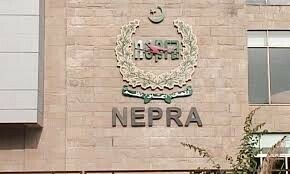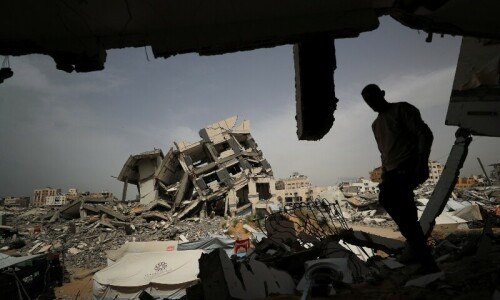AMRELI Steels Limited seems to have chosen the right moment to enter the capital market to mobilise funds for its expansion.
The company perhaps watched the investors’ response to the initial public offering of another steel company, Mughal Iron and Steel Industries. Flush with liquidity, the investors rapidly picked up that stock, resulting in an over-subscription for Mughal’s IPO.
With huge projects coming up, likely triggered by the China-Pakistan Economic Corridor (CPEC), steel sits tightly as the king on the throne.
Amreli Steels Limited’s (ASL) IPO is the second in the steel sector and the eighth new offering at the Karachi Stock Exchange this year. The company aims to raise Rs1.78bn from the offering.
“The IPO proceeds would be used to expand the company’s re-bar and billet manufacturing capacity with a total cost of Rs3.4bn,” the company says.
As is the practice for new entrants, the company offered 55.5m shares (75pc of the total offering) in the book-building phase to institutional and high-net worth individuals and received 2.5 times the bids for 138.8m shares. This set the strike price for the public auction of the remaining 25pc shares at Rs51 per share against the original floor price of Rs24.
‘Including the general public offer, the company would mobilise a total amount of Rs3.79bn, while the cost of the expansion project is Rs3.4bn, which will be now completely equity funded’
Taking notice of the public’s criticism over the book-building rules, the SECP had recently released new regulations to curb alleged manipulation in the process. As such, the ASL’s was the first IPO to take place after the announcement of the new book-building rules.
At the strike price of Rs51 per share, ASL has already raised Rs2.83bn from the book-building phase. “Including the general public offer, the company would mobilise a total amount of Rs3.79bn (assuming full subscription at the general offer), while the cost of the expansion project is Rs3.4bn, which will be now completely equity funded,” commented analysts at Taurus Securities.
The steel industry is confident of a surge in demand of its products. Domestic demand for steel is estimated at 3.5m tonnes per year. CPEC has an outlay of $45bn spread over 10 years, much of which has been pledged for infrastructure projects. In addition, private-sector construction is poised for a boom, with scores of new projects on the horizon, including those from Bahria Town, Fazaia Housing and DHA Cities.
“We visualise projects in the pipeline for the next 5-7 years that will require a staggering investment of Rs600bn,” asserts an official of the Association of Builders and Developers of Pakistan (Abad).
“While Pakistan is the 6th most populous nation in the world, it has one of the lowest per capita consumptions of steel. If the country’s per capita steel consumption rises over the next five years to equal even the average for developing countries, Pakistan will require an additional 6m tonnes of steel per annum,” says an industry source.
Analysts that follow the steel sector contend that ASL is one of the largest manufacturers of steel reinforcement bars (re-bars) in the country. It manufactured over 170,000 tonnes of re-bars in FY15 — the highest in the history of the country. Its re-rolling facilities are located at SITE in Karachi and its steel melting plant is located at Dhabeji, 16km from Port Qasim.
“The principal purpose of the [IPO] is to expand [the company’s] manufacturing facilities by enhancing the steel-melting capacity from 200,000 tonnes per annum to 350,000 tonnes and the re-rolling mill capacity from 180,000 tonnes to 480,000 tonnes,” Amreli disclosed in its prospectus for investors. The company aims to get the new project commence commercial production by May 2017.
The steel industry is not devoid of competition. According to a person associated with the business, more than 100 steelmakers are operating in the country. Besides, steel is also being imported.
However, listed steel companies are not generally comparable with other firms on the stock exchanges primarily because of their different product profiles and varying dependence on imports. Companies listed under the steel sector include: Huffaz Seamless Pipes, Aisha Steel, Crescent Steel and Allied Products, International Industries and Mughal Steel.
ASL’s available financial statements reveal that it had Rs12.3bn in assets and Rs5.4bn in equity by the fiscal year ending March 31. For the nine months ending September 30, the company earned an after-tax profit of Rs580m on revenue of Rs10.6bn. ASL has not paid any dividend so far and has retained all previous profits for the growth of its business.
“However, going forward, the company intends to follow a consistent profit-distribution policy for its members subject to profitability, availability of adequate cash flows and shareholders’ approval,” the company said.
It is mandatory for companies seeking to secure capital from the public to also indentify the risks associated with their business.
Amreli Steel has specified the following risk factors: business risk; risk of damage to property, plant and equipment; foreign exchange risk (i.e. a rupee depreciation could inflate the price of its imports, thus affecting profitability); raw material supply/price risk; power supply risk; operational risk; competitor risk; risk of technological obsolescence; capital market risk; diversification risk (i.e. the risk of being dependent on one particular buyer or market); and finally, the regulatory risk (in case policies unfavourable for the steel sector are imposed).
Published in Dawn, Business & Finance weekly, November 2nd , 2015
On a mobile phone? Get the Dawn Mobile App: Apple Store | Google Play


![AMRELI Steel said in its prospectus for investors that “the principal purpose of the [IPO] is to expand [the company’s] manufacturing facilities by enhancing the steel-melting capacity from 200,000 tonnes per annum to 350,000 tonnes and the re-rolling mill capacity from 180,000 tonnes to 480,000 tonnes”. AMRELI Steel said in its prospectus for investors that “the principal purpose of the [IPO] is to expand [the company’s] manufacturing facilities by enhancing the steel-melting capacity from 200,000 tonnes per annum to 350,000 tonnes and the re-rolling mill capacity from 180,000 tonnes to 480,000 tonnes”.](https://i.dawn.com/primary/2015/11/56365a0e7f20d.jpg)












































